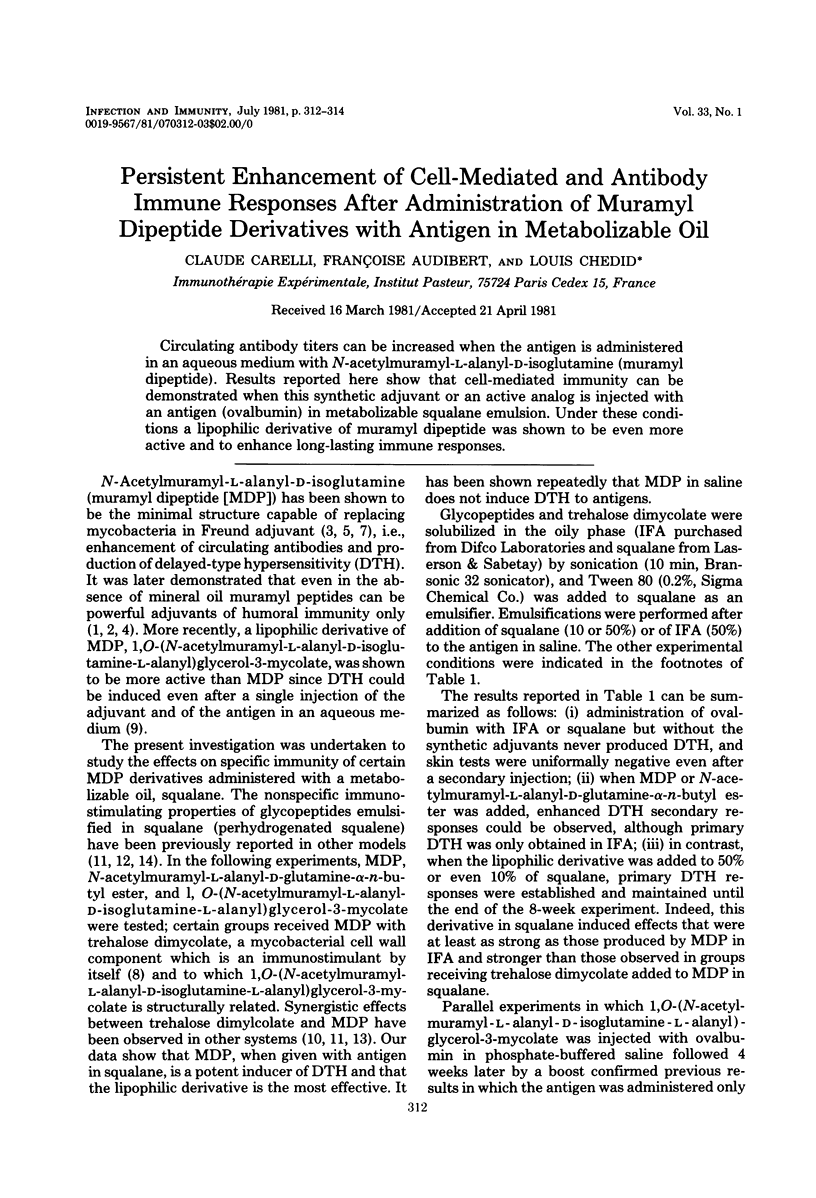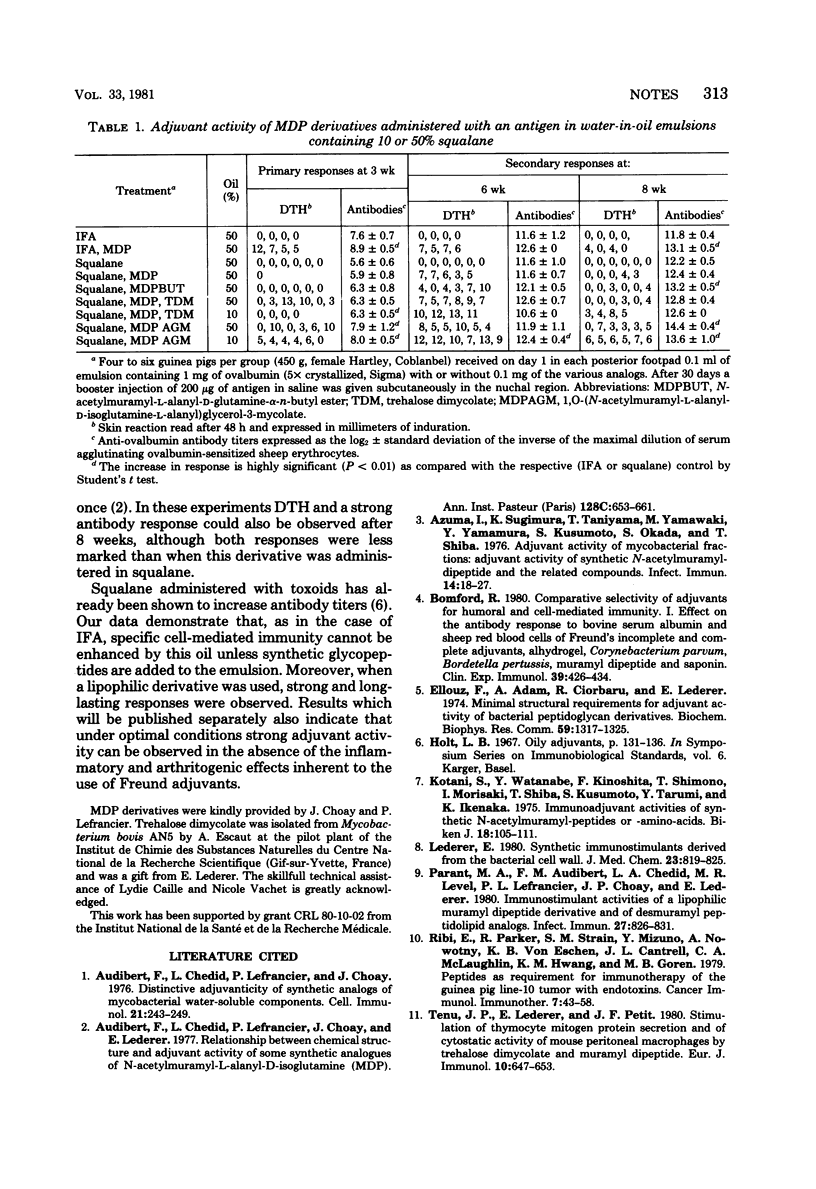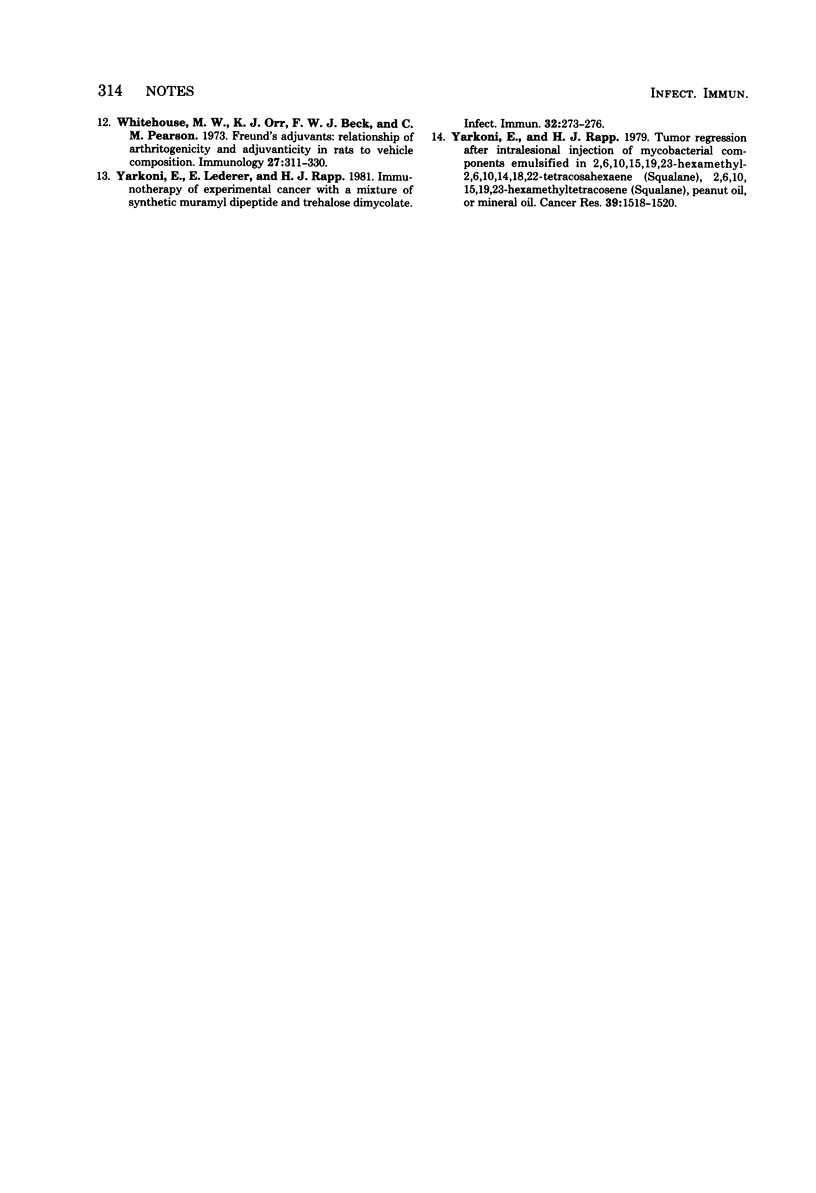Abstract
Circulating antibody titers can be increased when the antigen is administered in an aqueous medium with N-acetylmuramyl-L-alanyl-D-isoglutamine (muramyl dipeptide). Results reported here show that cell-mediated immunity can be demonstrated when this synthetic adjuvant or an active analog is injected with an antigen (ovalbumin) in metabolizable squalane emulsion. Under these conditions a lipophilic derivative of muramyl dipeptide was shown to be even more active and to enhance long-lasting immune responses.
Full text
PDF


Selected References
These references are in PubMed. This may not be the complete list of references from this article.
- Audibert F., Chedid L., Lefrancier P., Choay J., Lederer E. Relationship between chemical structure and adjuvant activity of some synthetic analogues of N-acetyl-muramyl-L-alanyl-D-isoglutamine (MDP). Ann Immunol (Paris) 1977 Apr-Jun;128C(3):653–661. [PubMed] [Google Scholar]
- Audibert F., Chédid L., Lefrancier P., Choay J. Distinctive adjuvanticity of synthetic analogs of mycobacterial water-soluble components. Cell Immunol. 1976 Feb;21(2):243–249. doi: 10.1016/0008-8749(76)90053-8. [DOI] [PubMed] [Google Scholar]
- Azuma I., Sugimura K., Taniyama T., Yamawaki M., Yamamura Y. Adjuvant activity of mycobacterial fractions: adjuvant activity of synthetic N-acetylmuramyl-dipeptide and the related compounds. Infect Immun. 1976 Jul;14(1):18–27. doi: 10.1128/iai.14.1.18-27.1976. [DOI] [PMC free article] [PubMed] [Google Scholar]
- Bomford R. The comparative selectivity of adjuvants for humoral and cell-mediated immunity. I. Effect on the antibody response to bovine serum albumin and sheep red blood cells of Freund's incomplete and complete adjuvants, alhydrogel, Corynebacterium parvum, Bordetella pertussis, muramyl dipeptide and saponin. Clin Exp Immunol. 1980 Feb;39(2):426–434. [PMC free article] [PubMed] [Google Scholar]
- Ellouz F., Adam A., Ciorbaru R., Lederer E. Minimal structural requirements for adjuvant activity of bacterial peptidoglycan derivatives. Biochem Biophys Res Commun. 1974 Aug 19;59(4):1317–1325. doi: 10.1016/0006-291x(74)90458-6. [DOI] [PubMed] [Google Scholar]
- Kotani S., Watanabe Y., Kinoshita F., Shimono T., Morisaki I. Immunoadjuvant activities of synthetic N-acetyl-muramyl-peptides or -amino acids. Biken J. 1975 Jun;18(2):105–111. [PubMed] [Google Scholar]
- Lederer E. Synthetic immunostimulants derived from the bacterial cell wall. J Med Chem. 1980 Aug;23(8):819–825. doi: 10.1021/jm00182a001. [DOI] [PubMed] [Google Scholar]
- Parant M. A., Audibert F. M., Chedid L. A., Level M. R., Lefrancier P. L., Choay J. P., Lederer E. Immunostimulant activities of a lipophilic muramyl dipeptide derivative and of desmuramyl peptidolipid analogs. Infect Immun. 1980 Mar;27(3):826–831. doi: 10.1128/iai.27.3.826-831.1980. [DOI] [PMC free article] [PubMed] [Google Scholar]
- Tenu J. P., Lederer E., Petit J. F. Stimulation of thymocyte mitogenic protein secretion and of cytostatic activity of mouse peritoneal macrophages by trehalose dimycolate and muramyldipeptide. Eur J Immunol. 1980 Aug;10(8):647–653. doi: 10.1002/eji.1830100813. [DOI] [PubMed] [Google Scholar]
- Whitehouse M. W., Orr K. J., Beck F. W., Pearson C. M. Freund's adjuvants: relationship of arthritogenicity and adjuvanticity in rats to vehicle composition. Immunology. 1974 Aug;27(2):311–330. [PMC free article] [PubMed] [Google Scholar]
- Yarkoni E., Lederer E., Rapp H. J. Immunotherapy of experimental cancer with a mixture of synthetic muramyl dipeptide and trehalose dimycolate. Infect Immun. 1981 Apr;32(1):273–276. doi: 10.1128/iai.32.1.273-276.1981. [DOI] [PMC free article] [PubMed] [Google Scholar]
- Yarkoni E., Rapp H. J. Tumor regression after intralesional injection of mycobacterial components emulsified in 2,6,10,15,19,23-hexamethyl-2,6,10,14,18,22-tetracosahexaene (squalene), 2,6,10,15,19,23-hexamethyltetracosane (squalane), peanut oil, or mineral oil. Cancer Res. 1979 May;39(5):1518–1520. [PubMed] [Google Scholar]


